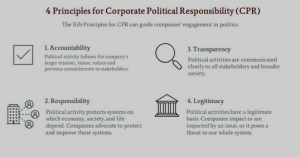Corporate responsibility for political lobbying involves conducting lobbying activities in a transparent, ethical, and socially responsible manner. Political lobbying refers to efforts by individuals or organizations to influence government decisions, policies, or legislation. Here are several ways companies can engage in responsible political lobbying:

How Companies can be Responsible for Political Lobbying
-
Table of Contents
ToggleTransparency and Disclosure:
- Public Reporting: Companies should openly disclose their lobbying activities, including the issues they advocate for, the amount of money spent on lobbying, and the strategies employed. Regular and detailed reporting enhances transparency and helps build trust with stakeholders.
-
Ethical Conduct:
- Adherence to Ethical Standards: Companies should establish and adhere to ethical guidelines for political lobbying. This includes avoiding deceptive practices, conflicts of interest, and any activities that may compromise integrity.
-
Alignment with Corporate Values:
- Alignment with Corporate Values and Mission: Companies should ensure that their lobbying activities align with their stated values, mission, and corporate social responsibility (CSR) commitments. Inconsistent actions can lead to reputational damage.
-
Stakeholder Engagement:
- Engaging with Stakeholders: Companies should involve key stakeholders, including shareholders, employees, and customers, in the decision-making process regarding political lobbying. This ensures that diverse perspectives are considered, and there is a broad understanding of the company’s advocacy efforts.
-
Advocacy for Public Interest:
- Supporting Policies for Public Good: Companies can focus their lobbying efforts on advocating for policies that benefit not only their interests but also contribute to the public good. This approach reflects a commitment to broader societal well-being.
-
Avoiding Covert Tactics:
- Avoiding Covert Influence: Responsible lobbying avoids covert or undisclosed attempts to influence political decisions. Companies should be transparent about their involvement and not engage in hidden or undisclosed lobbying practices.
-
Compliance with Regulations:
- Adherence to Legal Requirements: Companies must comply with all applicable laws and regulations governing lobbying activities. This includes understanding and adhering to campaign finance laws, disclosure requirements, and lobbying registration rules.
-
Sustainable and Long-Term Focus:
- Sustainable Advocacy: Companies should adopt a long-term perspective in their advocacy efforts, seeking policies that contribute to long-term economic, social, and environmental sustainability rather than focusing solely on short-term gains.
-
Employee Participation:
- Responsible Employee Engagement: If employees are involved in lobbying activities, companies should ensure that their participation is voluntary, transparent, and aligned with the company’s values. It’s important to provide guidelines and training on ethical lobbying practices.
-
Collaboration with Peers:
- Collaborative Industry Efforts: Companies can collaborate with industry peers, trade associations, and advocacy groups to amplify their voices and engage in responsible lobbying efforts collectively. Joint initiatives can promote industry-wide best practices.
-
Regular Review and Assessment:
- Continuous Evaluation: Companies should regularly review and assess their lobbying activities to ensure ongoing alignment with corporate values and societal expectations. Periodic evaluations can lead to adjustments in strategies and practices.
By integrating these principles into their approach to political lobbying, companies can contribute to a more responsible and accountable business environment. Responsible lobbying not only aligns with ethical business practices but also helps build trust with stakeholders, foster a positive corporate image, and contribute to a healthier democratic process.
